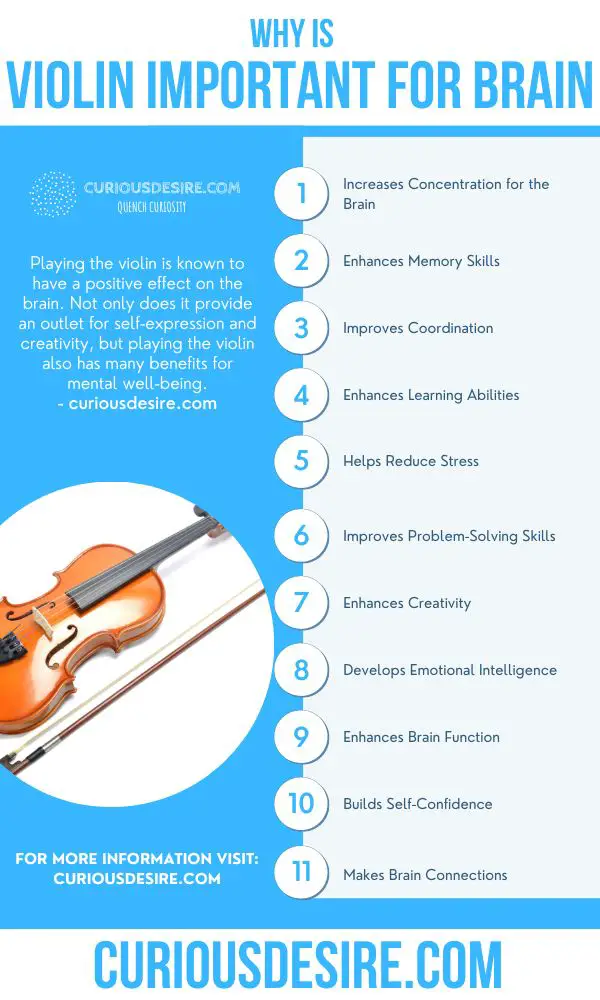Playing the violin is known to have a positive effect on the brain. Not only does it provide an outlet for self-expression and creativity, but playing the violin also has many benefits for mental well-being.
The violin can help to improve concentration, build memory, and foster a deeper appreciation for music. In this blog post, we’ll look at 15 reasons why violin is important for the brain.
15 Benefits of Violin for the Brain
The violin is an active, engaging activity that can provide both physical and mental benefits. Playing the violin has been linked to improvements in focus, memory, and emotional well-being. Here are 15 reasons why violin is important for the brain:
1. Violin Increases Concentration for the Brain
Playing the violin requires intense focus on each note and the relationship between them, improving concentration skills in the process. As a result, playing the violin can help to increase attention span and develop better overall listening skills.
Through the practice of playing the violin, musicians become better at focusing on tasks and ignoring distractions.

2. Violin Enhances Memory Skills
The act of playing the violin helps to develop a certain type of memory known as working memory. Working memory is necessary for activities such as problem-solving, multitasking, and learning new material quickly.
For instance, when playing the violin, one must remember how to finger each note and execute it correctly. This helps to strengthen memory in both short-term and long-term forms.
3. Violin Improves Coordination
To achieve true mastery of the violin, one must carefully synchronize their hands, fingers, eyes and mind. Musicians must be able to combine their cognitive skills with physical movements. As a result, the violin helps to improve hand-eye coordination, as well as fine and gross motor skills.
The practice of playing the violin also helps to improve posture by promoting proper form and technique.
4. Violin Enhances Learning Abilities
Music education programs have long been linked to improved academic performance in students. One study found that children who participated in music lessons had better scores on reading and Math tests than those who did not.
The practice of playing the violin is an excellent way to stimulate the brain, allowing for faster learning of new material and increased knowledge retention.
5. For Brain Violin Helps Reduce Stress
Playing music is a great way to relax and take your mind off of life’s stresses. When practicing the violin, one can enter into a state of “flow” – a trance-like state that allows for complete immersion in the activity at hand. This can help to reduce stress levels and promote feelings of well-being.
Research has also found that playing the violin can help to reduce symptoms of depression and anxiety.

Suggested Readings
Why violin is important in music?
Why violin is important in society?
6. Violin Improves Problem-Solving Skills
The act of playing the violin requires an individual to think critically and solve problems in real-time. Musicians must be able to make quick decisions with their fingers while also interpreting musical notation.
This helps to improve problem-solving skills, as well as analytical thinking. Through violin practice, problem-solving skills can be honed and improved.
7. Violin Enhances Creativity
Playing the violin helps to foster creativity by encouraging self-expression. Musicians can learn to improvise and compose music using their own unique style and skill set.
The act of playing the violin also helps to develop empathy, as musicians often work together in ensembles. This allows for creative collaboration, which is beneficial for both personal and professional settings.
8. Violin Develops Emotional Intelligence
The practice of playing the violin can help to develop emotional intelligence. This is due to the fact that musicians must be aware of how their emotions affect their performance. As a result, they learn to control their emotions in order to produce the desired musical outcome.
Through the practice of playing the violin, musicians can also learn to interpret and understand different types of music. This helps to increase one’s emotional intelligence, allowing them to better empathize with others.

9. Violin Enhances Brain Function
As mentioned earlier, the practice of playing the violin helps to stimulate and improve brain function. It can help improve concentration levels, allowing for better focus on the tasks. Furthermore, it also helps to sharpen mental clarity and boost creativity levels.
The practice of playing the violin also promotes overall cognitive development by strengthening neural connections in the brain. This can help enhance memory and learning capabilities, enhancing overall brain health.
10. Violin Enhances Disciplined Practice
Learning to play the violin requires a great deal of discipline and dedication. Musicians must practice regularly and consistently in order to improve their skills. This can help to develop a disciplined lifestyle that can be applied to other areas of life.
Playing the violin also helps to teach perseverance, as musicians must be willing to push through roadblocks and mistakes to reach the desired outcome.
11. Violin Builds Self-Confidence
The practice of playing the violin can help to boost self-confidence. Musicians can learn to recognize and accept their strengths and weaknesses while also learning how to become confident performers.
Musicians can also feel a sense of accomplishment by achieving set goals and mastering new pieces. This can help to increase self-esteem and confidence over time.
Suggested Readings
Why violin is important in school?
Why violin is important in the world?
Why violin is important in the workplace?
12. Violin Makes Brain Connections
Playing the violin helps to make new connections in the brain. This occurs as musicians learn to read music, interpret notes, and recognize patterns while playing.
These neural pathways are important for cognitive development and can help individuals become better problem solvers over time. Furthermore, these same pathways also help to improve memory and learning capabilities.

12. Violin Can Help to Enhance Mood
The act of playing music can have a profound effect on the brain. Studies have found that playing the violin can help to improve feelings of productivity, self-confidence and happiness.
Listening to music is also known to encourage positive emotions, such as joy and contentment. Playing the violin can be an excellent way to relax, unwind and soothe stress after a long day.
13. Violin Strengthen Brain Capacity
Playing the violin can help to strengthen brain capacity. This occurs as musicians learn to interpret music and utilize their auditory skills. With regular practice, musicians can increase their cognitive capabilities over time.
Furthermore, research has also found that playing an instrument can improve overall mental processing speed. This means that individuals who play the violin are able to recall information more quickly and accurately than those who don’t.
14. Violin Enhances Creative Thinking
The practice of playing the violin can also help to stimulate creative thinking. As musicians learn new pieces, they must think outside the box in order to find the best way of performing a piece. This helps to foster analytical skills and creative problem-solving.
Furthermore, playing the violin can also help improve improvisation skills, allowing musicians to think creatively. This can be a valuable skill that can be applied outside of the musical realm.
Suggested Readings
Why violin is important in a relationship?
Why violin is important for a child?
15. Violin Relaxes the Brain and Body
Playing the violin can be a great way to relax both the brain and body. It encourages mindfulness, allowing musicians to focus on the present moment instead of worrying about future concerns.
The practice of playing music also helps to encourage relaxation by releasing endorphins like dopamine and serotonin. This helps to induce a sense of calm, relaxation and well-being.
Conclusion
The practice of playing the violin can be a great way to enhance overall brain health. It encourages creative thinking, strengthens cognitive abilities, and relaxes the mind and body.
It also helps to build self-confidence and teach discipline through regular practice. With dedication and hard work, individuals can become proficient at playing the violin, enriching their lives in the process.
Overall, playing the violin can be a fun and rewarding experience that offers numerous benefits for both physical and mental health. With regular practice and commitment, anyone can become a proficient musician.
Relevant Articles
Why violin is important in music?
Why violin is important in society?
Why violin is important in school?
Why violin is important in the world?
Why violin is important in the workplace?